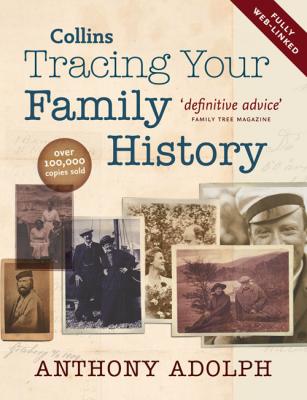Collins Tracing Your Family History. Anthony Adolph
Читать онлайн.| Название | Collins Tracing Your Family History |
|---|---|
| Автор произведения | Anthony Adolph |
| Жанр | Справочная литература: прочее |
| Серия | |
| Издательство | Справочная литература: прочее |
| Год выпуска | 0 |
| isbn | 9780007373567 |
TNA also maintains Access to Archives, an online catalogue to material held in many British archives, including the county record offices. Once you have found material that interests you it also provides links to the Archon Directory www.nationalarchives.gov.uk/archon, to give you full contact details for the archive concerned.
In the old days censuses were kept at Portugal Street, and General Registration records of birth, marriage and death were kept at Somerset House, then St Catherine’s House, and then the Family Records Centre. Now all are on file/fiche at TNA, and are increasingly available online.
OTHER ARCHIVES
Wales: Wales was officially subsumed by England in 1536, but it has its own archives in the National Library of Wales.
Scotland: Scotland’s National Archives of Scotland (NAS), are now part of the new ScotlandsPeople Centre. The catalogues of this and most other Scottish archives are available at www.scan.org.uk.
Ireland: Both Eire and Northern Ireland have central archives, the National Archives of Ireland and the Public Record Office of Northern Ireland (PRONI). (Contact details for these addresses in Ireland are given in the Quick Reference panel below.)
COUNTY RECORD OFFICES
Unlike TNA, county record offices are a relatively new innovation, starting from the archiving work of George Herbert Fowler in 1913.
The county record offices grew out of the old diocesan record offices and their main achievement was bringing together many of each county’s public records under one roof, and it was this that helped fuel the first boom in family history research in the 1970s. Most county record office catalogues are now accessible through Access to Archives. Offline, an excellent guide to the county record offices is J. Gibson and P. Peskett’s Record Offices: How to find them (FFHS, 1996).
OTHER ARCHIVES
The best guide to specialist archives is J. Foster and J. Sheppard’s British Archives: A Guide to Archive Resources in the United Kingdom (Palgrave, 2002). One page alone gives details of the Carpenters’ Company archives in the City of London, which date from the Middle Ages; the Carlton Club, with registers of members from 1832; and Camden Local Studies Centre, whose holdings include records of the Manor of Hampstead 1742–1843 and the papers of George Bernard Shaw.
MUSEUMS AND LIBRARIES
Both are excellent for background information on what places were like when your ancestors lived there, but they can also hold extraordinary collections that may include information on your families. Foremost is the British Library, whose website includes its catalogue to manuscripts and printed books, enabling you to search for what you want and order it before you go.
Local museums and libraries, especially local studies libraries, hold photographic collections for the locality, and the librarians themselves are often very knowledgeable about the area, electoral registers, local maps, and so on.
MORMON WEBSITE AND FAMILY HISTORY CENTRES
With its world HQ at the Family History Library, the Mormon church, officially the Church of Jesus Christ of Latter-day Saints, maintains about 100 Mormon Family History Centres around the UK, freely open to the public and containing many useful genealogical resources. The church’s interest in family history is religious – its aim ultimately is to identify as many people as possible, living and dead, in the context of their family relationships. To this end, they have amassed a vast collection of microfilms of original records from all over the world, including many British archives and many records described in this book. Any of these can be ordered to your local centre. The timorous should be reassured that visitors are entirely safe from any attempt to convert them – far from it: Mormons have made an immense contribution to this field, accessed for free. The Mormons’ free website, www.familysearch.org, is described in detail here. Another Salt Lake-based organisation, MyFamily.Com, which owns Ancestry.Com, has a pay-to-view website (www.ancestry.com), which contains a great and growing number of records, especially drawn from censuses.
QUICK REFERENCE
HISTORIC MANUSCRIPTS COMMISSION (HMC)
www.nationalarchives.gov.uk/archives-sector/hmc.htm
NATIONAL ARCHIVES (TNA)
www.nationalarchives.gov.uk
NATIONAL REGISTER OF ARCHIVES
www.nationalarchives.gov.uk/nra
ACCESS TO ARCHIVES
www.A2A.org.uk
ARCHON DIRECTORY
www.nationalarchives.gov.uk/archon
GENERAL REGISTER OFFICE (GRO)
www.gro.gov.uk/gro/content/
NATIONAL LIBRARY OF WALES
(LLYFRGELL GENEDLAETHOL CYMRU)
www.llgc.org.uk
NATIONAL ARCHIVES OF SCOTLAND (NAS)
www.nas.gov.uk/
NATIONAL ARCHIVES OF IRELAND
www.nationalarchives.ie
PUBLIC RECORD OFFICE OF NORTHERN IRELAND (PRONI)
http://www.proni.gov.uk/
BRITISH LIBRARY
http://blpc.bl.uk
MORMON FAMILY HISTORY CENTRES
www.familysearch.org
OTHER WEBSITES
SCOTLANDSPEOPLE
Scotland’s Old Parochial Registers, censuses, testaments (wills) and much of its General Registration is online at a pay-to-view site.
Scotland’s very own research website home page.
GENES REUNITED
There are a number of websites that aim to link up family trees, but the most exciting is www.genesreunited.co.uk. The site allows you to enter details of your family (or upload a family tree already typed in ‘Gedcom’ format), building an online family tree, which is easily altered and amended.
A number of search tools then enable you to find out if surnames on your tree appear on other trees on the site. In return for a £9.50 a year membership fee, you can email the contributors of other possibly relevant names and work out if you do indeed have ancestors in common, and if so create a link between the two trees. Those with common surnames will be relieved to know that the searches can be honed, by personal name, year of birth and by place of birth.
The site was launched
